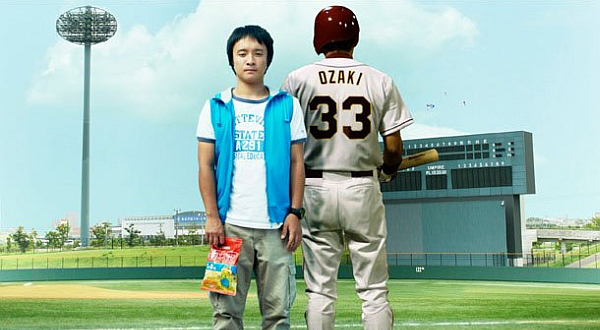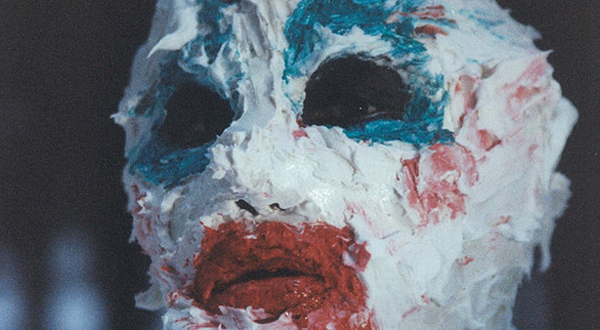Tomorrow night the New York Asian Film Festival comes to an official close, with two movies. They have two things in common; both are super short. Otherwise, they could not be any more different?
Potechi (Chips)

Simply put, Yoshihiro Nakamura is the greatest director in Japan that you’ve never heard of. His films have become a staple of the NYAFF for the past four years, and is always the cream of the crop in each instance. Though I honestly can’t recall anyone’s output being so consistently and legitimately amazing, regardless of their nation of origin. As somewhat hinted at in my review for Smuggler; despite my love for Asian cinema as a whole, I’m actually not a huge fan of stuff from Japan; when they’re good, good God they’re amazing, but when they’re bad, holy sh*t that was terrible. As also noted, my biggest pet peeve is how, way too often, everything is built up to a fever pitch crescendo, to only just end abruptly, with some philosophical mumbo jumbo tacked on. Cuz that’s deep, man. But not Nakamura. He’s also the master of layering a dizzying amount of complicated plot threads on top of each other, to have everything and everyone come together in the very end in a manner that will literally drop your jaw. An approach in storytelling that is attempted often, and usually ends up being contrived and pushes the boundaries of what a person is will to accept in the world of movies. Which I guess can be considered the case here, but there’s so much ingenuity and soul that you don’t mind with it from Nakamura. And his latest, Potechi Chips, is yet another home run.
Despite being only an hour and ten minutes, it’s still the heady mix of reality-blowing/heart-warming coincidences that is Nakamura’s expertise, but in a far more concentrated form. The short running time also means it doesn’t have time to be as sprawling or epic as his previous work (though make no mistake, it’s still pretty wacky), and another bonus is how the underlining intention of the movie, which is a love letter to the city of Sendai (which was the epicenter of the 2011 earthquake) all the more potent and touching. The center of it all is Tadashi, a professional thief. One day, while sifting through someone’s home, the phone rings, which then goes to voicemail. It’s a girl, telling the robbery victim that’s she had enough of this world and is going to jump off a building. Even though it’s clearly none of his business, Tadashi calls back to ask where she is. He eventually catches up with her, and not only is he able to talk her down, but she ends upcoming his girlfriend. Not bad! Her name is Wakaba, btw. Later on, she decides to tag along with Tadashi and learn the tricks of his trade. This victim this time is Ozaki, a professional baseball player whose career is less than spectacular. Not only does Wakaba discover her bf’s love for baseball, but how he idolizes Ozaki. Turns out, both dudes grew up in the same town, and his achievements back in the day made him a hometown hero. Even Tadashi’s mother is a fan of Ozaki, which Wakaba discovers firsthand when mom decides to be buddy-buddy with her son’s gf. She also discovers that Tadashi’s mother considers her son to be a world class loser, which kinda sucks.
Anyway, same thing that happened before happens again; Ozaki’s phone rings while Tadashi and Wakaba are casing the joint, and it’s another girl who leaves a voicemail. This person seems to be asking for help, from a pesky stalker that won’t leave her alone. Feeling that it’s his job to be the hero once again, Tadashi decides to help this girl, so his hero can concentrate on being the MVP for his team. But when the good samaritan burglars catch the girl coming out of the stalker’s apartment, they soon realize that there’s a scheme afoot. Soon comes the pivotal moment in which Tadashi gets him and his girl some potato chips; she asked for consomm? flavored ones, but he got salt flavored ones by accident. But that’s okay, because they turned out better than she expected and thanks him for making the mistake, because it was better than what was expected. Which thus causes Tadashi to cry. Why? Because Tadashi has been having a existential crisis, all due to recent doctor’s finding. Something that makes his connection to Ozaki far deeper than just being neighbors, and which may also explain why his mother has never been particularly fond of her offspring, since almost day one. And the emotional gut punch that’s the ending is perhaps the most eloquent, most profound ever from Nakamura yet, which is saying a lot. Mostly due to the fact that, one more, the movie is intended to be a love letter to a city that has been ravaged by immense tragedy, and whose denizens could surely use a reminder as to how powerful and inspiring the human spirit can be.
And they certainly got it, in the form of a little movie that’s named after a snack. I know it’s late notice, but do whatever you can to catch the screening later tonight at 8pm, at Japan Society. Also, please do yourself a favor and check out Fish Story on Netflix Instant if you haven’t do so already (it’s a safe bet that 99% of those reading this have not). It too is basically everything that is good about Japanese cinema, and movies in general.
Monsters Club

Remember what I said about Potechi (Chips)? Specifically, how one of the main reasons why it’s so awesome is because it’s the complete opposite of the kinds of movies from Japan that I generally can’t stand? Unfortunately, Monsters Club is basically what I talking about. Building up to it’s screening, the NYAFF and Japan Society has constantly stressed how it’s something different, something challenging, perhaps because even they knew that, by contemporary Japanese cinema standards, it’s a stinker. Mostly because the director, Toshiaki Toyoda, will be in attendance and they want to make sure the entire ordeal with be as pleasant as possible (and whose previous work, The Blood of Rebirth, is a movie I didn’t mind, so it’s not like I’m being unnecessary mean towards the guy). The thing is, it’s not like Monsters Club’s elevator pitch is anything bad: it’s essentially a Japanese take on the Unibomber, from a Japanese version of Ted Kaczynski himself, but with ghosts added to the mix, sounds mighty intriguing, doesn’t it? The fact that it was shot in only two weeks, up in the mountains, sans any script, also adds to the curiosity factor. Too bad the end result is pretty dismal.
The story goes something like this: Ryoichi is a dude who lives in a log cabin, up in the snowy mountains, and spends his time making bombs and mailing it to whom he believes to be the cornerstones of today’s miserable existence, like those who influence education and the media. It’s a thankless, solitary life that he embraces, because he’s on a mission: to inject some antidote into a society that’s been poisoned, like others have attempted before him. And everything is going swimmingly until he starts seeing dudes completely covered by shaving cream and raw meat. Eventually one of them, meat one, decided to make himself at home in Ryoichi’s pad and have a chat. Turns out it’s one of dead brothers, Kenta; we discover that Ryoichi’s father was a very rich man, who passed away and left his money to his children. But Kenta died in an accident, and other brother Yuki commits suicide for some reason. The later bro is the important one here; he’s the guy that Ryoichi looked up to the most and was the inspiration for his off the grid, anti-establishment way of life. And Kenta is here to remind that his still breathing sibling that, no matter what, he’s a still wannabe wiener who will never fill the shoes of his hero. Ryoichi also has a sister, Mikana, who?s the only other living family member, and a willing participant in the human rat race. Who doesn’t particularity mind it, and occasionally stops by and check in on her eccentric brother. Surprisingly, Ryoichi doesn’t give his sis a hard time about her choice of existence, and even offers to pay for a chunk of her college studies. Wait, doesn’t that somewhat go against why he’s cooped up in a cabin in the first place, making bombs and the like? Which might explain why Ryoichi is being haunted by the ghost of Yuki and visions of his former family.
And I assure you, my description of the movie is about a hundred times more engaging than the actual movie. Not to give anything away, but it ends in the same precise manner that way that I’ve already bitched about. Not helping is that we have to hear Ryoichi’s philosophical ramblings the entire way through, and to a certain extent, I should have seen the “gee, that’s it?” ending a mile away. Given my strong negative reaction towards the movie, and the universal praise that it’s gotten across the board otherwise, one of its defenders might argue that I just don’t “get” Monsters Club. Whatever. And look, I do recognize it for what it’s trying to be: a tale of someone who is angry at the world he lives in, because of the loss of a loved one, and whom he’s trying to still impress by continuing his cause. But is ultimately not doing the best job possible. Maybe because society is far too pervasive and those ideals cannot be met, hence why his brother took his life, or maybe because it’s just clear that the last man standing loves life too much when all is said and done. It just clearly was not made for me, and I love experimental filmmaking. On the plus side, the cast is stellar (and does the best that they can with the nonexistent script), the movie looks and sounds great (the sound design in particular is fairly outstanding), and was only 72 minutes long (but it’s honestly 72 minutes too long, in the end). Monsters Club plays tonight, right before Chips. I say don’t bother.
Though Toshiaki Toyoda is also the director of 9 Souls, which is part of Japan Cuts and sounds promising. It’s about nine folk, including a biker, a porno peddler, a murder, and a midget, who all escape prison. I’m hoping that it’s much better Monsters Club, and will be finding out for myself this coming Thursday evening. I’ll also be covering a bit of that festival as well, but I still have a few NYAFF reviews left to file!

Pingback: Japan Cuts 2012: “Rent-A-Cat” & “Space Battleship Yamato” + Not A Broken Record, But A Severely Bent One | FORT90.com